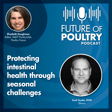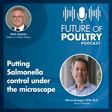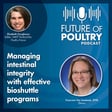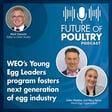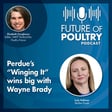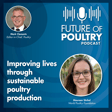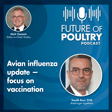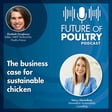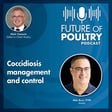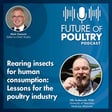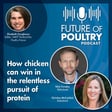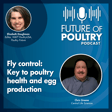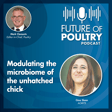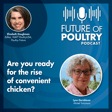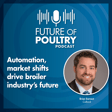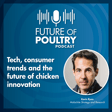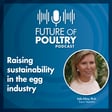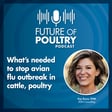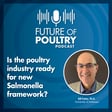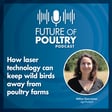Become a Creator today!Start creating today - Share your story with the world!
Start for free
00:00:00
00:00:01

Duck farming 101: Biosecurity, tradition and innovation
Elizabeth Doughman, editor, WATT PoultryUSA and Poultry Future, and Joey and Michael Jurgielewicz, Joe Jurgielewicz & Son, talk about what makes duck production unique.
Transcript
Introduction to Future of Poultry Podcast
00:00:00
Speaker
Hello and welcome to the Future of Poultry podcast series.
00:00:12
Speaker
Hello, I'm Elizabeth Duffman, the editor of Watt Poultry USA and Poultry Future. This podcast
Poultry Knowledge Challenge with Watt Poultry Weekly Hatch
00:00:18
Speaker
is sponsored by the Watt Poultry Weekly Hatch. Test your poultry knowledge with the Watt Poultry Weekly Hatch.
00:00:24
Speaker
the fun, brain-boosting game made just for poultry crows. You'll have just six attempts, but there's only one answer. Are you ready to crop the poultry work puzzle? Sign up today to get the Watt Poultry Weekly Hatch delivered to your inbox each week. For more information, go to wattpoultry.com slash wattpoultry dash weekly dash hatch.
00:00:43
Speaker
Today,
Opportunities in U.S. Duck Production
00:00:44
Speaker
we're expanding our flock focus to explore an increasingly important segment of the U.S. poultry industry, duck production. While turkeys and layers dominate much of our agricultural landscape,
00:00:54
Speaker
Duck farming represents a growing niche market with unique opportunities and challenges.
Jergewitz Family Duck Farm: A Veterinarian-Owned Venture
00:00:59
Speaker
In this episode, my guests are Joey and Michael Jergewitz from Joe Jergewitz & Son. Thanks for joining me today, Joey and Michael.
00:01:06
Speaker
Thanks Liz for having us. Our company started back in 1933 when our great grandfather immigrated from Poland and the first original Long Island, but one of the first original Long Island duck farms.
00:01:18
Speaker
And that is where my dad was born and raised out there on the farm in Long Island. And then fast forward, my dad went to Cornell Veterinarian School and then started his duck farm in 1985 in Hamburg, Pennsylvania, with the help of his dad, our grandfather.
00:01:34
Speaker
And like I said, my dad was went to vet school. So still to this day, we are the only veterinarian owned and operated duck farm in North America, maybe the world. And myself, I work in the business development department along with my brother, Joey.
00:01:50
Speaker
Like Mike was saying, we are a family business. So we have our dad, Dr. Joe. Our other brother is Dr. Jim, who is also a veterinarian. And myself, who Michael and I get to work together in the business development and marketing department. So from product development to taking care of national clients to you name it, talking duck. That's what we've been doing in our entire lives from picking eggs up to our current role right now. So I think we got a promotion, but excited to be in this industry and excited for our podcast today.
00:02:17
Speaker
What are
Customized Equipment for Duck Production
00:02:18
Speaker
the key operational differences between duck production and broiler production that other poultry producers should understand? um So naturally, a duck is not a chicken by any means. So it's so we're not looking at we're not comparing apples to apples by by terms of by going from how it the end product is all the way to the beginning of the product. So a lot of it is we're such a small industry. We're such a niche industry that a lot of our equipment, you could say from handouts, hatching to raising to processing has to be custom designed.
00:02:47
Speaker
You can't just open up a magazine or say, Hey, I'm going to start a build a duck barn today or a duck processing plant. A chicken or a turkey one is a little bit, i don't want say it's a little bit easier, but it's a little more cookie cutter. Yes. Great, great word for that.
00:03:00
Speaker
So we have to customize everything specifically for our breed of ducks. They grow differently. They eat differently. They walk differently. They they drink differently. So that's really the biggest thing is that it's just a lot of industry specific equipment for us and raising techniques.
00:03:16
Speaker
And as a biggest difference, as Joey said, it's not apples are apples. We all know duck is a waterfowl. So like in the processing plant, we have a whole different beginning process and we are saving all our feathers we could and then we wash and dry them because we can sell them to make pillows, down blankets and coats.
Challenges in Duck Processing and Feather Removal
00:03:34
Speaker
What would you say are the primary challenges in duck processing and how does that differ from chicken processing? So like Michael was saying with with feathers, that's one of the biggest things. We're a waterfowl.
00:03:45
Speaker
So we have we have down as part of the duck. So that's just, it's mother's nature's best insulator and also to keep the ducks warm. Also ourselves and ski coats or our pillows and everything. So is feather removal is the biggest one. So just that the technique of removing duck feathers is totally different than chickens. So the biggest difference is we use a, after the ducks are slaughtered or processed, we scold the ducks and they go to a wax tank. So just someone to get go to a spa to get waxed the same thing with the duck. So we put the wax on the bird.
00:04:16
Speaker
We chill that wax, remove that wax from the skin of the bird, and that will pull off all the little whatever down particles or feathers that are still left on it. So that's one of the biggest differences. And then after that is a lot of it, a lot of duck processing, since we are such a small industry, our lines don't move that fast is a lot of hand processing still. So there's not a lot of automatic evisceration equipment either.
Biosecurity Measures for Duck Farming
00:04:37
Speaker
What kind of biosecurity protocols are specific to duck operations, particularly given that waterfowl's different disease susceptibilities and environmental needs? A lot of it just is fundamentals, is just really is just having just biosecurity practices that are just consistently being taught and retaught to our staff, to our growers of making sure that we're not cross-contaminating feed trucks, trucks that are picking eggs up, delivering live birds, picking up live birds. So it's really just is focusing on the fundamentals.
00:05:07
Speaker
On your comment on waterfowl, what we found was that ducks in the past two years, unfortunately, have they tend to catch the bird flu, for lack of better words, a lot easier, quicker than chickens or even some turkeys out there. And I think it's just like we see in humans with the different strains of the flu that it just, unfortunately, this strain in the last couple of years just really has come after ducks.
00:05:29
Speaker
And since like we know that happens a lot easier with ducks, we do have a whole veterinarian services team that is, as Joey said, constantly out there making sure our buyer security is as flawless as possible and reteaching and all the practices to our employees and staff and growers.
00:05:47
Speaker
What
Market Opportunities in Duck Farming
00:05:48
Speaker
advice would you give to poultry producers considering diversifying into duck production? My advice, Ray, would be is to join our duck family. We're always looking for new growers. We are looking for promoting duck.
00:05:59
Speaker
When we sell duck, which is Michael's and my job, our main jobs in the marketplace is it's a differentiator. It can make your menu more appealing. It offers a, it's an alternative protein.
00:06:10
Speaker
in lack of better words. it's not We're not a commodity product, so like chicken or beef or pork. So or less there's not a lot of influence from, say, political events, economic events in the world.
00:06:21
Speaker
It's a nice, consistent, safe industry to be in. And we welcome all and willing to talk to anybody that wants to talk, Doc.
Favorite Duck Recipes and Versatility
00:06:28
Speaker
What's your favorite way to eat duck? As Joey said, it's a very versatile product. Most people, I would say, when they think about duck or how you're going to prepare duck or eat duck out in the restaurant, you're thinking maybe high in like French or Asian.
00:06:42
Speaker
So obviously one of my favorite is still like the traditional Peking duck where you are, it's carved table side with the pancakes, hoisin sauce, scallion cucumbers and wrapped up.
00:06:52
Speaker
But something that's A little more versatile and new new product that we actually launched and that I absolutely love is our new duck carnitas. And so we confit our leg and thigh meat and then you take it off the bone and you can serve it in a flour tortilla or corn tortilla with a little cilantro, onion, and a homemade salsa. It's divine.
00:07:14
Speaker
Oh, that makes me really hungry. Thanks again, Julie and Michael, and thanks to you for tuning in. For more episodes of the Future Poultry podcast, please like and subscribe on WattPoultry.com or wherever you access podcasts.
